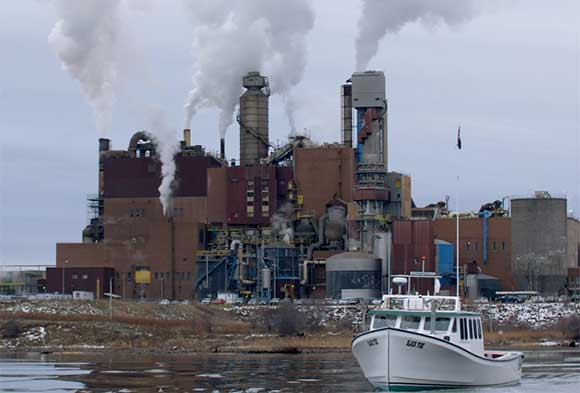The Mill was born out of proximity and necessity. Growing up in New Brunswick where pulp mills were a fact of life I barely noticed them or their effects. Like most folks I knew little about forestry despite its importance to the community where I lived. The Northumberland Strait made more of an impression and later in life I found myself drawn back to that familiar shoreline.
When my partner and I bought property in Caribou just outside of the town of Pictou we knew about the mill but it didn’t impede our decision. In 2014 things changed. The air in the Town of Pictou, just four miles away, became unbearable as the mill operated full bore without pollution controls. People protested, connected on social media and a Clean The Air Concert brought national attention to the situation. Still it took several years to rectify.
2014 was also the year the Mi’kmaq community of Pictou Landing shut down the mill with a blockage to protest a pipeline break that spilled over 40 million litres of untreated effluent on their traditional burial ground. To resolve the impasse, the Nova Scotia government of Stephen McNeil promised to close the notorious Boat Harbour effluent treatment plant that had plagued Pictou Landing since the mill started operating fifty years ago. These events raised my awareness of the impact of the mill on the community even if I was still a seasonal resident. By 2017 when the mill proposed placing an effluent pipe into the Northumberland Strait to replace the old treatment facility I felt an obligation to get involved. This time it was personal.
I was also inspired by Joan Baxter’s book The Mill: Fifty Years of Pulp and Protest. In December 2017 it made national headlines when Joan’s book signing in New Glasgow was cancelled. Mill workers had threatened to boycott the local bookstore if it went ahead. Joan had consolidated decades of local lore and conducted solid journalistic research to share the history of Pictou County’s pulp mill. I optioned the book immediately after reading it.

For too long decisions governing the interests of the community have been made behind closed doors and against a background where protest is ground down by bureaucratic stonewalling and secrecy.
The alliance of indigenous and non-indigenous fishermen and their opposition to the mill’s effluent pipe shaped the conflict that is the crux of the documentary. Much of the complicated history of the collusion between the government and the foreign owners of the mill had to go by the wayside for a 44-minute television documentary. Growing up in the region I was aware that for too long decisions that governed the interests of the community have been made behind closed doors and against a background where protest is ground down by bureaucratic stonewalling and secrecy. I wanted The Mill to contribute to an informed and balanced debate and expand public awareness of the mill and its future prospects. “Showing Canada to Canadians” was the famous motto for the National Film Board of Canada but it also instilled the belief in a generation of documentary filmmakers, including me, that filmmaking and democracy were intertwined. I was thrilled and grateful when the CBC, our public broadcaster, commissioned the film.
Our documentary team followed fishermen, community activists, and citizens voicing their opposition to the pipe through demonstrations and grass roots organizing. We reached out to Northern Pulp, forestry workers and politicians for their perspectives. In the process I learned a lot about Pictou County and its people — my neighbours. This is truly a situation where there are “good people on both sides.” The delicate equilibrium between the pulp mill and its community has shattered. No longer will people rationalize the mill’s emissions as the ‘smell of money.’ Intolerance for the mill’s environmental impact, combined with growing awareness of injustices imposed on the local Mi’kmaq community mark a significant change in attitude here.
We must change not only in Pictou County but everywhere and change is hard. I want The Mill to reflect the experiences of people grappling with this process.
– David W. Craig, Director







